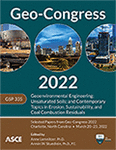Enhanced Landfill Methane Oxidation Using Activated Biochar
Publication: Geo-Congress 2022
ABSTRACT
Biochar, a solid porous product derived from waste biomass, has garnered profound attention from the geoenvironmental engineers in the recent years, due to its ability to absorb wide range of gaseous and liquid phase contaminants. One important application of biochar that has been explored recently is the use in landfill cover soil to enhance microbial methane oxidation. The unique properties of biochar such as high-internal porosity, high-moisture retention, and presence of recalcitrant carbon compounds offer conducive environment for the methane oxidizing microbes to proliferate and thrive in the long-term exposure to landfill methane, thereby enhancing aerobic methane oxidation and mitigating landfill methane emissions. Although biochar has shown promising potential to enhance methane oxidation, the addition of inert biochar in the landfill cover soil leads to an initial lag phase due to the time required for microbial acclimation and may result in lower methane oxidation rates in comparison to the soil alone which has already been exposed to the landfill gas. However, once the microbes are acclimated, the effect of biochar kicks in and transcends the capacity of soil alone to oxidize landfill methane. This paper investigates reduction of the initial lag phase caused by addition of inert biochar using an activated biochar. Activated biochar was prepared by soaking biochar in a methanotrophic bacterial consortium isolated from a landfill cover soil. Several series of laboratory batch and column experiments were performed with activated biochar amended soil, non-activated biochar amended soil, and unamended soil to quantify methane oxidizing potential. DNA based 16S rRNA gene amplicon sequencing was performed to characterize and compare the microbial community. The activated biochar amended soil showed higher methane oxidation rates and efficiency from the beginning of the incubation in batch and column experiments in comparison to the non-activated biochar amended and unamended soils. The cumulative methane uptake of 10% non-activated biochar amended soil was lower than the unamended soil until initial 50 days of batch incubation which increased rapidly thereafter. The carbon dioxide generation and significant increase in methylotrophic relative abundance confirmed methane oxidation. Overall, the activated biochar showed promising potential to reduce the initial lag phase and enhance microbial methane oxidation in landfill cover soil.
Get full access to this article
View all available purchase options and get full access to this chapter.
REFERENCES
Abushammala, M. F., Basri, N. E. A., Irwan, D., and Younes, M. K. (2014). Methane oxidation in landfill cover soils: A review. Asian J. Atmos. Environ., 8(1), 1–14.
Bogner, J. E., Spokas, K. A., and Chanton, J. P. (2011). “Seasonal greenhouse gas emissions (methane, carbon dioxide, nitrous oxide) from engineered landfills: Daily, intermediate, and final California cover soils.” J. Environ. Qual., 40(3), 1010–1020.
Contin, M., Goi, D., and De Nobili, M. (2012). “Land application of aerobic sewage sludge does not impair methane oxidation rates of soils.” Sci. Total Environ., 441, 10–18.
Gebert, J., Röwer, I. U., Scharff, H., Roncato, C. D., and Cabral, A. R. (2011). “Can soil gas profiles be used to assess microbial CH4 oxidation in landfill covers?.” Waste Manage., 31(5), 987–994.
Huber-Humer, M., Tintner, J., Böhm, K., and Lechner, P. (2011). Scrutinizing compost properties and their impact on methane oxidation efficiency. Waste Management, 31(5), 871–883.
Kallistova, A. Y., Montonen, L., Jurgens, G., Münster, U., Kevbrina, M. V., and Nozhevnikova, A. N. (2013). “Culturable psychrotolerant methanotrophic bacteria in landfill cover soil.” Microbiology, 82(6), 847–855.
Mor, S., De Visscher, A., Ravindra, K., Dahiya, R. P., Chandra, A., and Van Cleemput, O. (2006). “Induction of enhanced methane oxidation in compost: Temperature and moisture response.” Waste Manage., 26(4), 381–388.
Rai, R. K., Chetri, J. K., and Reddy, K. R. (2019). “Effect of Methanotrophic-Activated Biochar-Amended Soil in Mitigating CH4 Emissions from Landfills.” In Proc. 4th International Conference on Civil and Environmental Geology and Mining Engineering, Trabzon, Turkey.
Reddy, K. R., Rai, R. K., Green, S. J., and Chetri, J. K. (2019). “Effect of temperature on methane oxidation and community composition in landfill cover soil.” J. Ind. Microbiol. Biotechnol., 46(9-10), 1283–1295.
Reddy, K. R., Yargicoglu, E. N., and Chetri, J. K. (2021). “Field-scale performance of biochar-amended soil covers for landfill methane oxidation.” Biomass Convers. Biorefin., 1–16.
Reddy, K. R., Yargicoglu, E. N., Yue, D., and Yaghoubi, P. (2014). “Enhanced microbial methane oxidation in landfill cover soil amended with biochar.” J. Geotech. Geoenviron., 140(9), 04014047.
Scheutz, C., and Kjeldsen, P. (2004). “Environmental factors influencing attenuation of methane and hydrochlorofluorocarbons in landfill cover soils.” J. Environ. Qual., 33(1), 72–79.
USEPA. (2021). Basic Information about Landfill Gas. Landfill Methane Outreach Program (LMOP). Available at https://www.epa.gov/lmop/basic-information-about-landfill-gas (accessed on June 1, 2021).
Xie, T., Sadasivam, B. Y., Reddy, K. R., Wang, C., and Spokas, K. (2016). “Review of the effects of biochar amendment on soil properties and carbon sequestration.” J. Hazard Toxic Radioact. Waste, 20(1), 04015013.
Yargicoglu, E. N., and Reddy, K. R. (2017a). “Microbial abundance and activity in biochar-amended landfill cover soils: evidence from large-scale column and field experiments.” J. Environ. Eng., 143(9), 04017058.
Yargicoglu, E. N., and Reddy, K. R. (2017b). “Effects of biochar and wood pellets amendments added to landfill cover soil on microbial methane oxidation: A laboratory column study.” J. Environ. Manage., 193, 19–31.
Yargicoglu, E. N., and Reddy, K. R. (2018). “Biochar-amended soil cover for microbial methane oxidation: Effect of biochar amendment ratio and cover profile.” J. Geotech. Geoenviron, 144(3), 04017123.
Information & Authors
Information
Published In
Copyright
© 2020 ASCE.
History
Published online: Mar 17, 2022
Authors
Metrics & Citations
Metrics
Citations
Download citation
If you have the appropriate software installed, you can download article citation data to the citation manager of your choice. Simply select your manager software from the list below and click Download.
